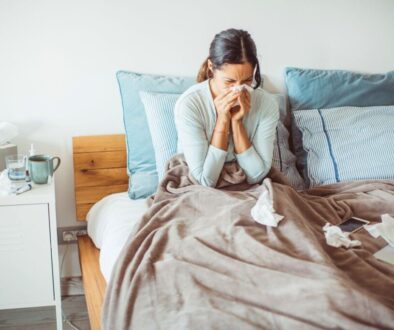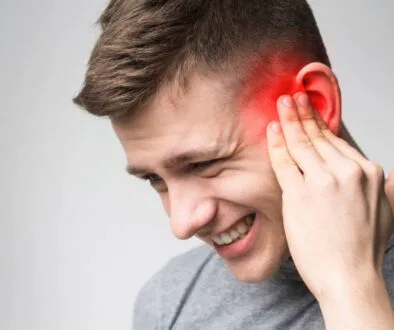Why Do I Cough After I Eat: Key Triggers And Management Tactics
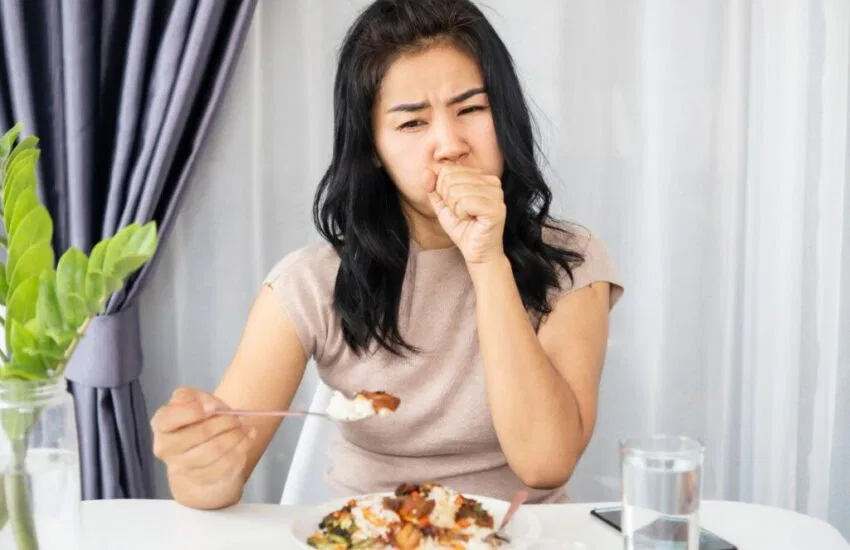
Published October 31, 2024
Coughing after eating is surprisingly common and more than just a minor annoyance. Many experience this involuntary response as the body tries to clear irritants from the airways. However, frequently coughing after meals could indicate underlying health issues that shouldn’t be ignored.
In this article, we’ll explore a common concern: why do I cough after I eat? We’ll examine the underlying causes, discuss prevention strategies, and identify when to see a doctor.
What Causes Coughing After Eating?
Coughing after eating can be unsettling for many, and you might wonder, “Why do I cough after I eat?” This discomfort is often caused by various factors that disrupt normal swallowing or irritate the respiratory system.
Acid Reflux
Acid reflux occurs once stomach acid flows back into the esophagus, leading to irritation that may trigger coughing. This condition can be particularly bothersome after meals.
Gastroesophageal reflux disease (GERD) is defined by chronic acid reflux. This can lead to a persistent cough that often worsens when lying down or after eating. In contrast, laryngopharyngeal reflux (LP), known as “silent reflux,” allows stomach acid to reach the throat and nasal passages. It does so without the typical symptoms of heartburn. This type of reflux can cause coughing, an urge to clear the throat or a feeling of a lump in the throat.
Food Allergies
Food allergies trigger an immune response. This can trigger symptoms like coughing, wheezing, hives, and gastrointestinal discomfort. Common allergens include peanuts, tree nuts, shellfish, milk, eggs, and soy.
Recognizing allergens is crucial for anyone who experiences post-meal coughing due to food allergies. Even tiny traces of these allergens can cause severe reactions, highlighting the need for careful attention to food choices.
Dysphagia
Dysphagia is a condition that makes swallowing hard. It can cause food or liquids to get stuck in the throat, triggering coughing as the body tries to remove the obstruction. Dysphagia can result from nerve or muscle issues that disrupt the swallowing reflex. It is often associated with various medical conditions, such as stroke and neurological disorders.
Eating quickly or without paying attention to the texture and size of food can worsen dysphagia. Individuals with this condition must follow dietary modifications. Adhering to recommended strategies is equally important.
Aspiration Pneumonia
Aspiration occurs when food or liquid accidentally enters the lungs instead of the stomach. This can lead to aspiration pneumonia, a potentially serious condition that may require medical intervention. The issue is particularly concerning for individuals with swallowing disorders, neurological conditions, or weakened lung function, who face a higher risk of aspiration.
When aspiration happens, the body often reacts with coughing as a protective reflex to expel the inhaled material. If coughing persists, it may indicate the need for medical evaluation. Early intervention can help prevent potential complications.
Choking
Improper chewing or distractions while eating can lead to choking. Coughing occurs as the body tries to clear the obstruction from the throat, which is particularly dangerous. Choking can result in loss of consciousness or require emergency intervention.
Chewing food thoroughly is essential. It helps reduce the risk of choking incidents. Minimizing distractions during meals can also make a difference. Taking time to focus on eating is vital.
Asthma
Certain foods and additives can worsen asthma. Sulfites in wine and dried fruits are common triggers. Additionally, some preservatives found in processed foods can provoke symptoms. When these triggers lead to an asthma attack, coughing often occurs alongside wheezing and shortness of breath.
Individuals with asthma should know their specific food triggers and make an effort to avoid them, especially during meals.
Infections
Upper respiratory tract infections, including viral infections and bacterial ailments like strep throat, can cause persistent coughing after meals. These infections lead to inflammation and irritation, making swallowing and breathing more difficult. Additionally, post-nasal drip from sinus infections can irritate the throat, triggering coughing during or after eating.
Understanding the causes of coughing after meals is vital to effective management. By identifying these issues, individuals can take necessary measures to alleviate discomfort. Next, we’ll discuss strategies for managing and preventing post-meal coughing.
Ways To Prevent Coughing After Eating
Coughing after eating can be uncomfortable and disruptive, making meals less enjoyable. Luckily, there are several effective strategies on how to stop coughing after eating or prevent it from becoming more severe.
Take Smaller Bites
Taking small-sized bites and chewing food thoroughly can make swallowing easier. This aids your body in digesting food better and lowers the risk of coughing. Additionally, chewing allows saliva to break down food before it reaches your throat, enhancing digestion.
Avoid Certain Foods
It is essential to recognize and steer clear of foods that provoke coughing. Be mindful of items that can cause allergies, such as nuts, dairy, and gluten. Also, watch out for foods that may lead to acid reflux, like spicy or greasy dishes. Avoiding these triggers can help reduce the chances of coughing after meals.
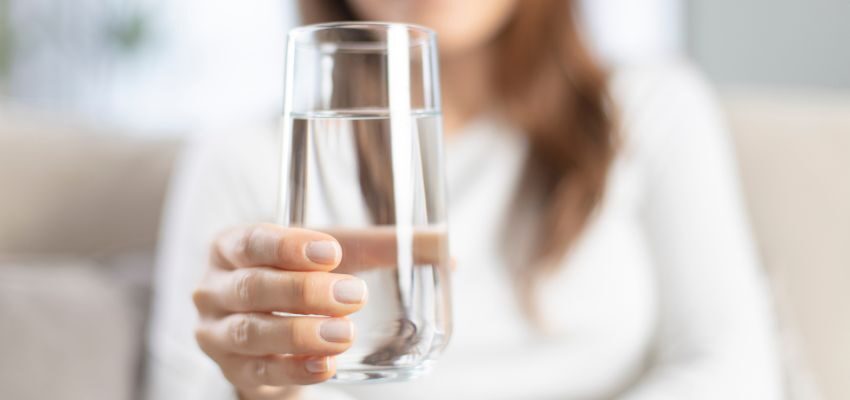
Drink Water
Staying hydrated is crucial for overall health. Drinking water during meals helps with easier swallowing. It also keeps your throat moist, reducing irritation that may cause coughing. It’s better to sip water slowly throughout your meal instead of gulping down large amounts at once.
Elevate Your Head
If you often cough after meals, it may be beneficial to adjust your sleeping position. Elevating your head while you sleep or rest can help prevent acid reflux, a common cause of post-meal coughing. Keeping stomach acid where it belongs is vital. Utilizing pillows or a wedge can make a considerable difference in your comfort.
Address Underlying Conditions
If you often cough after meals, it’s essential to identify any underlying health issues. Conditions like GERD, dysphagia, and asthma can contribute to this symptom. Seeking medical help or treatment can alleviate your symptoms and improve your comfort.
Be Aware Of Your Cough
Keeping a journal to track your cough can be very helpful. Record the frequency, timing, and potential triggers. This documentation allows you to manage the issue better. It also provides valuable information to healthcare providers. With this data, they can suggest more targeted treatment options. This awareness helps you make informed choices about your diet and lifestyle, reducing coughing episodes.
Consider Incorporating Probiotic Supplements
Adding probiotics to your diet can help digestion and support overall gut health, which may reduce coughing triggers. Probiotics help maintain an ideal balance of gut bacteria, essential for efficient digestion. Foods rich in probiotics, such as yogurt, kefir, and fermented vegetables, can benefit your meals.
Utilize A Humidifier
A humidifier is beneficial for alleviating dry throat issues that can lead to coughing. The addition of moisture to the air keeps your throat hydrated, helping minimize irritation and reducing the risk of coughing, especially in dry or chilly environments. This simple improvement to your home can significantly enhance your comfort, particularly during mealtimes.
Adopting these strategies can enhance your dining experience and significantly reduce the chances of coughing after meals.
When To See A Doctor
Not everyone who coughs after eating needs to see a doctor right away. However, some situations do require medical attention:
- Coughing after meals is frequent
- The cough persists for more than two weeks
- The cause of the cough is unclear
- There is blood present in the mucus
- The individual is an active smoker
- The cough progressively worsens
- Additional symptoms are present, such as coughing mucus after eating
In these cases, it’s advisable to seek professional medical advice.
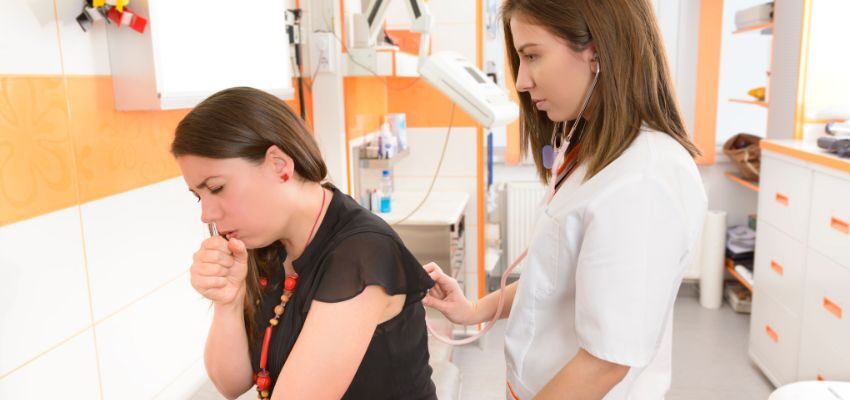
Breathe Easy: Practical Steps To Manage Coughing After Eating
Coughing after eating can often be managed with simple lifestyle changes, and being aware of triggers is important. Many people wonder, “Why do I cough after I eat?” Knowing the causes and preventive measures can help individuals enjoy meals more comfortably. However, a medical evaluation may be needed to address any underlying conditions if symptoms are persistent or severe. It’s also crucial to maintain overall health. If you have concerns, seek professional medical advice, and don’t hesitate to consult your doctor for personalized guidance.
Benefit From The Latest Advancements In Probiotic Science With Bionaze
Bionaze is a proprietary blend of probiotics proven to promote ear, nose, and throat health, improve digestion, and support your immune system. The active ingredients BLIS K12, and BL-04 are considered among the best probiotics according to science.
Get 25% Off Your First Order when you use BIO25 at checkout!

This Content Has Been Reviewed For Factual Accuracy
This content has undergone thorough fact-checking by our team of internal experts. Learn more about the meticulous editorial standard for our website here.
ADVERTISEMENT

About The Author
Hi, I’m Corinne Grace, a proud nursing graduate from Riverside College with a flair for writing. I specialize in health and wellness topics, using my educational background to weave informative and attention-grabbing articles that appeal to a wide variety of readers. Committed to excellence in writing, I’m always refining my skills to stay in sync with the fast-evolving world of digital media. Whether you’re seeking to understand complex health concepts or looking for relatable advice, I’m here to deliver content that’s accurate and enjoyable to read.


